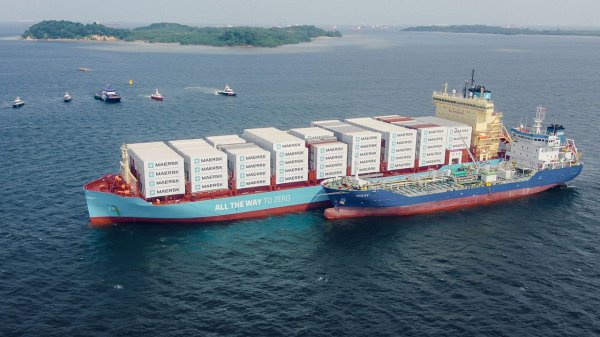DNV GL to class methanol-fuelled tankers
Classification society says it sees methanol as part of the future energy mix for shipping.
The first four vessels to use DNV GL's rules for low flash point fuels will be a series of 50,000 dwt tankers ordered by the owners Marinvest and Westfal-Larsen. According to DNV GL, the ships are "the very first to be fuelled by methanol".
The product carriers will be built at Hyundai Mipo Dockyards and are scheduled for delivery in 2016.
Methanol is a low flash point liquid (LFL) fuel that is gaining interest in the market because it does not contain sulphur and is therefore suitable for meeting the upcoming 0.1 per cent SOx Emission Control Area requirements.
Methanol has a flash point of about 12 degrees Celsius and the new vessels will be assigned the additional notation 'LFL FUELLED' to demonstrate their compliance with the safety requirements set out in the industry-first rules published by DNV GL in June 2013.
"Some important safety measures that will be incorporated into these vessels relate to the location of tanks and piping to prevent energy impact from sources such as grounding or cargo operations, a full secondary fuel containment system, leakage detection, automatic shutdown functions and ignition prevention. The safety philosophy is similar to that of gas-fuelled ships," said Håkon Skaret, DNV GL Business Director Tankers.
DNV GL was the first classification society to publish LFL rules and sees methanol as part of the future energy mix for shipping. As well as having low SOx and NOx emissions, a methanol fuel system is easy to retrofit on a ship.
DNV GL has been involved in the newbuilding project from the early design stage, working together with the ship owner, engine maker and yard to ensure an equivalent level of safety to that of a conventional fuel oil system. DNV GL has made use of its long experience with LFL cargo handling on chemical tankers and offshore supply vessels designed to transport low flash point cargo and its experience with alternative fuels from 15 years of working with gas-fuelled ship installations.
Image: Mariline fuel tanker ship, owned by Marinvest and operated by Waterfront Shipping.
The product carriers will be built at Hyundai Mipo Dockyards and are scheduled for delivery in 2016.
Methanol is a low flash point liquid (LFL) fuel that is gaining interest in the market because it does not contain sulphur and is therefore suitable for meeting the upcoming 0.1 per cent SOx Emission Control Area requirements.
Methanol has a flash point of about 12 degrees Celsius and the new vessels will be assigned the additional notation 'LFL FUELLED' to demonstrate their compliance with the safety requirements set out in the industry-first rules published by DNV GL in June 2013.
"Some important safety measures that will be incorporated into these vessels relate to the location of tanks and piping to prevent energy impact from sources such as grounding or cargo operations, a full secondary fuel containment system, leakage detection, automatic shutdown functions and ignition prevention. The safety philosophy is similar to that of gas-fuelled ships," said Håkon Skaret, DNV GL Business Director Tankers.
DNV GL was the first classification society to publish LFL rules and sees methanol as part of the future energy mix for shipping. As well as having low SOx and NOx emissions, a methanol fuel system is easy to retrofit on a ship.
DNV GL has been involved in the newbuilding project from the early design stage, working together with the ship owner, engine maker and yard to ensure an equivalent level of safety to that of a conventional fuel oil system. DNV GL has made use of its long experience with LFL cargo handling on chemical tankers and offshore supply vessels designed to transport low flash point cargo and its experience with alternative fuels from 15 years of working with gas-fuelled ship installations.
Image: Mariline fuel tanker ship, owned by Marinvest and operated by Waterfront Shipping.

|
VARO Energy expands renewable portfolio with Preem acquisition
All-cash transaction expected to complete in the latter half of 2025. |
|
|
|
||

|
NYK trials biofuel in milestone coal carrier test
Vessel is used to test biofuel for domestic utility company. |
|
|
|
||

|
H-Line Shipping orders LNG bunkering vessel
Vessel with 18,000-cbm capacity to run on both LNG and MDO. |
|
|
|
||

|
How to engineer and manage green shipping fuels | Stanley George, VPS
Effective management strategies and insights for evolving fuel use. |
|
|
|
||

|
Swedish government bans scrubber wastewater discharges
Discharges from open-loop scrubbers to be prohibited in Swedish waters from July 2025. |
|
|
|
||

|
MAN Energy Solutions achieves 100% load milestone for ammonia engine
Latest tests validate fuel injection system throughout the entire load curve. |
|
|
|
||

|
Petrobras secures ISCC EU RED certification for B24 biofuel blend at Rio Grande
Blend consisting of 24% FAME is said to have been rigorously tested to meet international standards. |
|
|
|
||

|
Stolt-Nielsen to fully control Avenir LNG with acquisition
Share purchase agreement to buy all shares from Golar LNG and Aequitas. |
|
|
|
||

|
Bureau Veritas supports launch of CIMC SOE's LNG bunkering vessel
Handover of Seaspan Energy's cutting-edge 7,600-cbm vessel completed. |
|
|
|
||

|
Methanol as a marine fuel | Steve Bee, VPS
How environmental legislation has driven the development of low-sulphur fuels and methanol-ready ships. |
|
|
|
||
Related Links
- · New ships to run on methanol [Insights]
- · Waterfront vessels to run on methanol and diesel fuel [Insights]
- · Fuel cell testing project continues [Insights]
- · Wärtsilä installs 'unique' fuel cell unit on vessel [Insights]

